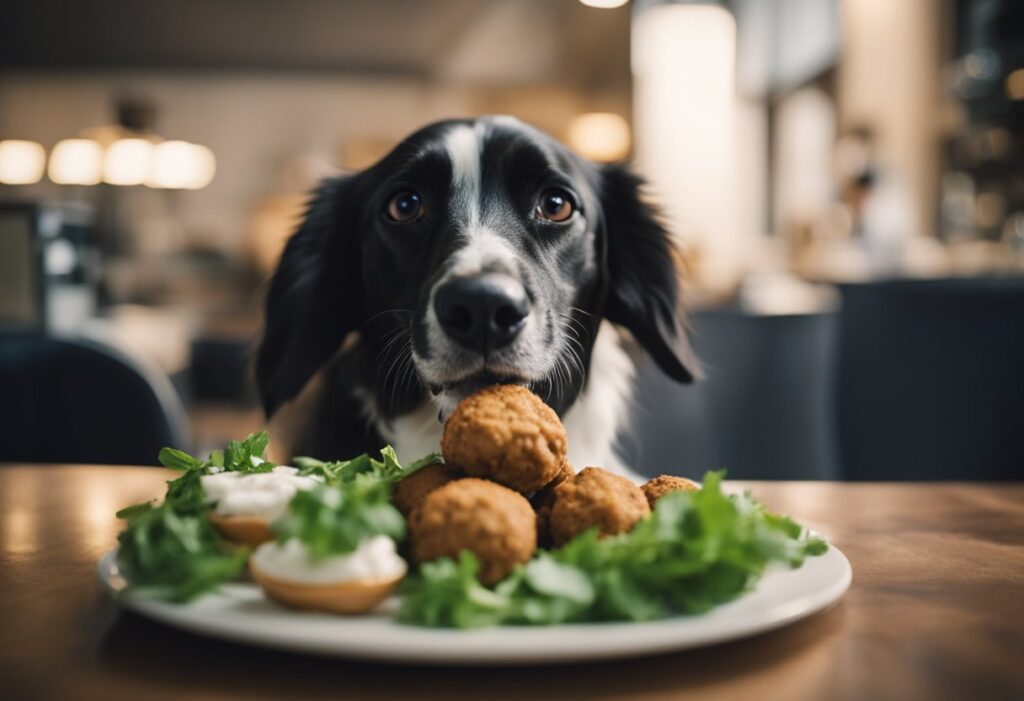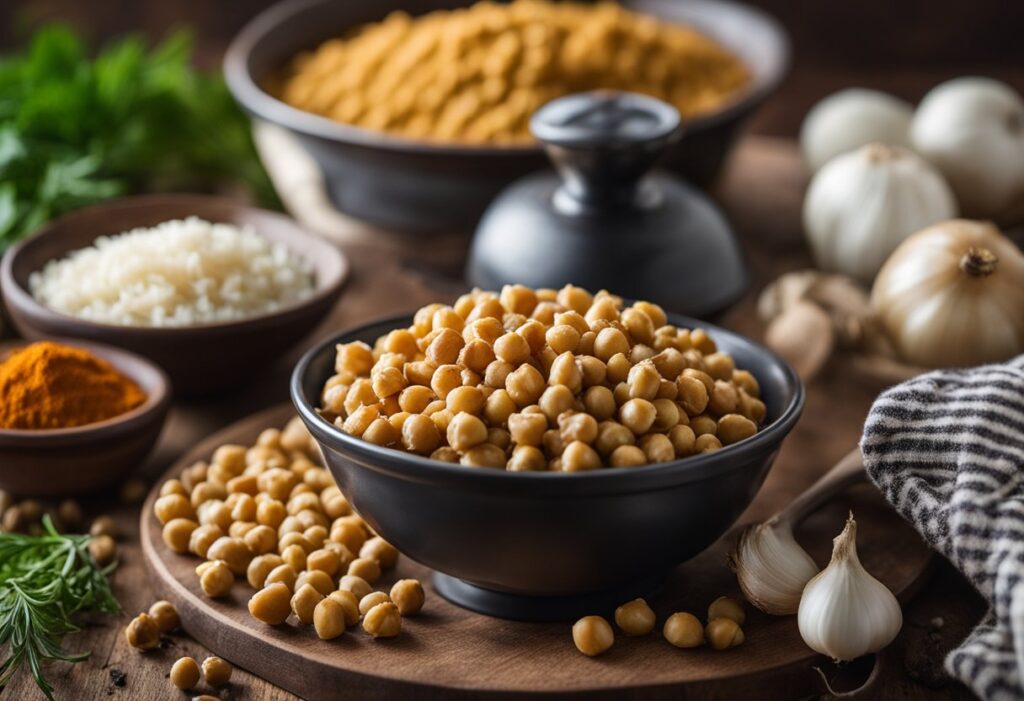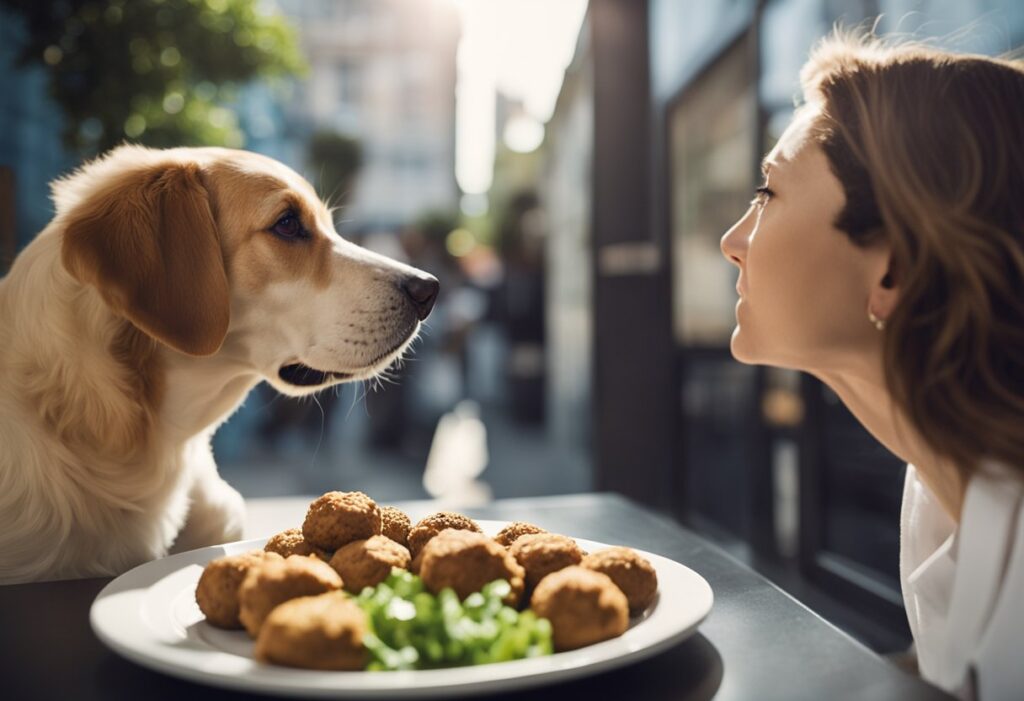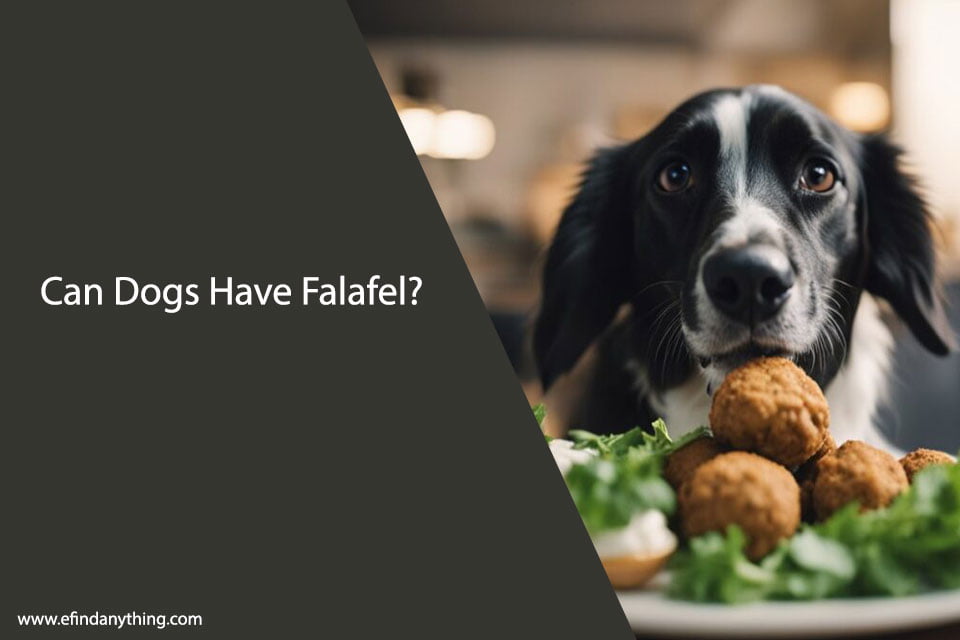Dogs are known to be curious creatures, always sniffing around and begging for a taste of whatever their owners are eating. As responsible pet owners, it’s important to ensure that our furry friends are not consuming anything that could potentially harm them. This leads us to the question: can dogs have falafel?

Falafel is a popular Middle Eastern dish made from ground chickpeas, herbs, and spices. While it may seem like a healthy and tasty treat for dogs, it’s important to note that certain ingredients in falafel can be harmful to them. For example, garlic and onion, which are commonly used in falafel recipes, can cause anemia in dogs if consumed in large quantities.
As pet owners, we want to provide our dogs with the best possible nutrition to keep them healthy and happy. While falafel may not be the best choice for our furry friends, there are plenty of dog-friendly foods that we can offer them as treats. Let’s explore the topic of dogs and falafel further to understand why it’s best to avoid feeding this dish to our four-legged companions.
Table of Contents
Can Dogs Eat Falafel?

Falafel is a popular Middle Eastern dish made from ground chickpeas, herbs, and spices. It is often served in a pita with vegetables and a variety of sauces. As dog owners, we may be tempted to share our falafel with our furry friends, but is it safe for them to eat?
Nutritional Concerns
Falafel is a vegetarian dish, which means it contains no meat. However, it does contain a variety of ingredients that may not be suitable for dogs. For example, falafel is high in fat, which can lead to obesity and other health problems in dogs if consumed in large quantities. Additionally, falafel is often fried, which can make it even higher in fat and calories.
On the other hand, falafel is a good source of protein and fiber, which are important nutrients for dogs. Chickpeas, the main ingredient in falafel, are also rich in vitamins and minerals such as iron, magnesium, and potassium. However, it is important to note that dogs have different nutritional needs than humans, and their diets should be based on their specific requirements.
Potential Health Risks
While falafel may contain some beneficial nutrients for dogs, there are also potential health risks associated with feeding it to them. One concern is that falafel may contain spices or herbs that are toxic to dogs, such as garlic and onion. These ingredients can cause anemia and other health problems in dogs if consumed in large amounts.
Another potential health risk is that falafel may cause digestive upset in dogs. Chickpeas and other legumes can be difficult for dogs to digest, especially if they are not used to eating them. This can lead to bloating, gas, and diarrhea.
In conclusion, while falafel may contain some beneficial nutrients for dogs, it is not recommended to feed it to them on a regular basis. If you do decide to give your dog a small amount of falafel as a treat, make sure it does not contain any spices or herbs that are toxic to dogs, and monitor them closely for any signs of digestive upset. As always, it is best to consult with your veterinarian before making any changes to your dog’s diet.
Ingredients in Falafel

Falafel is a popular Middle Eastern dish that is made from ground chickpeas or fava beans. It is often served as a vegetarian or vegan option due to its plant-based ingredients. In this section, we will discuss the main ingredients in falafel and their nutritional value.
Chickpeas and Nutritional Value
Chickpeas are the primary ingredient in falafel. They are a good source of protein, dietary fiber, and essential vitamins and minerals. A 100-gram serving of cooked chickpeas contains approximately 19 grams of protein, 8 grams of dietary fiber, and 14% of the recommended daily intake of iron. They are also a good source of folate, phosphorus, and potassium.
Onions and Garlic Toxicity
Onions and garlic are commonly used in falafel recipes for their flavor. However, they can be toxic to dogs in large quantities. Onions contain a compound called thiosulphate, which can cause damage to a dog’s red blood cells, leading to anemia. Garlic also contains thiosulphate, but in smaller amounts. While a small amount of onion or garlic in falafel is unlikely to harm a dog, it is best to avoid feeding them large quantities.
Salt and Spices
Salt and spices are used to enhance the flavor of falafel. While small amounts of salt are not harmful to dogs, excessive salt intake can lead to dehydration, vomiting, and diarrhea. Spices such as cumin, coriander, and parsley are commonly used in falafel recipes and are safe for dogs in small quantities. However, some dogs may be sensitive to certain spices, so it is best to introduce them to new foods gradually.
In conclusion, falafel can be a healthy and tasty snack for humans, but it is important to be mindful of the ingredients when feeding it to dogs. Chickpeas are a nutritious source of protein and fiber, but onions and garlic should be avoided in large quantities. Salt and spices can be used in moderation, but it is best to introduce them gradually and monitor your dog’s reaction.
Safe Alternatives to Falafel

Dog-Safe Treat Options
As much as we love to share our food with our furry friends, it’s important to remember that some human foods can be harmful to dogs. If you’re looking for a tasty treat to give your pup, here are some safe alternatives to falafel:
- Carrots and celery: These crunchy vegetables are low in calories and high in fiber, making them a great snack for dogs.
- Apples: Apples are a good source of vitamins A and C, and they’re also low in fat. Just be sure to remove the seeds and core before giving them to your dog.
- Peanut butter: Most dogs love peanut butter, and it’s a good source of protein and healthy fats. Just make sure to choose a brand that doesn’t contain xylitol, which is toxic to dogs.
Homemade Dog-Friendly Recipes
If you’re feeling adventurous, you can also make your own dog-friendly treats at home. Here are a few recipes to try:
- Frozen yogurt bites: Mix plain yogurt with mashed banana and freeze in small, bite-sized portions.
- Sweet potato chews: Slice sweet potatoes into thin rounds and bake in the oven until crispy.
- Chicken jerky: Slice chicken breast into thin strips and bake in the oven at a low temperature until dry and chewy.
Remember to always check with your veterinarian before introducing new foods to your dog’s diet, and to avoid giving your dog any foods that are toxic or harmful.
Feeding Best Practices

Portion Control
When feeding your dog falafel, it is important to keep portion control in mind. While falafel can be a healthy addition to your dog’s diet, overfeeding can lead to digestive issues and weight gain. We recommend starting with a small portion and gradually increasing the amount based on your dog’s individual needs.
It is also important to consider your dog’s overall diet when feeding falafel. If your dog is already consuming a high-fat diet, adding falafel may not be the best choice. We suggest consulting with your veterinarian to determine the appropriate amount and frequency of falafel to include in your dog’s diet.
Identifying Allergies
Just like humans, dogs can have food allergies. Before introducing falafel into your dog’s diet, it is important to identify any potential allergies. Common symptoms of food allergies in dogs include itching, vomiting, and diarrhea.
To determine if your dog is allergic to falafel, we suggest starting with a small portion and monitoring their reaction. If your dog experiences any symptoms of an allergic reaction, stop feeding falafel immediately and consult with your veterinarian.
In summary, when feeding your dog falafel, it is important to practice portion control and identify any potential allergies. By following these best practices, you can safely incorporate falafel into your dog’s diet as a healthy and tasty treat.
When to Consult a Veterinarian

While falafel is generally safe for dogs to consume in moderation, there are certain instances where it is important to consult a veterinarian before feeding your dog falafel.
Firstly, if your dog has a history of digestive issues or food sensitivities, it is best to consult with a veterinarian before introducing any new food into their diet, including falafel. Some dogs may be allergic to certain ingredients in falafel, such as chickpeas or spices, which can cause vomiting, diarrhea, or other gastrointestinal issues.
Secondly, if your dog has a medical condition that requires a specific diet, it is important to consult with a veterinarian before feeding them falafel. For example, dogs with kidney disease may require a low protein diet, which would not be suitable for falafel, as it is high in protein.
Lastly, if your dog has consumed a large amount of falafel or is exhibiting any signs of illness after consuming falafel, it is important to seek veterinary care immediately. Signs of illness may include vomiting, diarrhea, lethargy, or loss of appetite.
In summary, while falafel can be a healthy and tasty treat for dogs in moderation, it is important to consult with a veterinarian before feeding it to your dog, especially if they have a history of digestive issues or medical conditions. If your dog exhibits any signs of illness after consuming falafel, seek veterinary care immediately.
Frequently Asked Questions
Are chickpeas safe for dogs to consume?
Chickpeas are safe for dogs to consume in moderation. They are a good source of protein, fiber, and vitamins for dogs. However, too much chickpeas can lead to digestive issues such as bloating and gas. It is recommended to introduce chickpeas to your dog’s diet gradually and in small amounts.
Is it okay for dogs to eat cooked chickpeas?
Yes, cooked chickpeas are safe for dogs to eat. However, it is important to avoid adding any spices or seasoning, as they can be harmful to dogs. Plain, cooked chickpeas are the best option for your furry friend.
Can canines have chickpea-based pasta safely?
Chickpea-based pasta is safe for dogs to consume, as long as it is plain and without any added spices or seasoning. However, it is important to note that pasta should not be a regular part of your dog’s diet, as it is high in carbohydrates and can lead to weight gain.
Is chickpea hummus a safe treat for dogs?
Chickpea hummus is safe for dogs to consume in small amounts. However, it is important to avoid any hummus that contains garlic or onion, as they can be toxic to dogs. Additionally, the high fat content in hummus can lead to pancreatitis in dogs, so it should only be given as an occasional treat.
Are canned chickpeas a healthy option for dogs?
Canned chickpeas are safe for dogs to consume, but it is important to choose the low-sodium option and rinse them thoroughly before feeding them to your dog. Canned chickpeas are also high in calories, so they should only be given as a treat and in moderation.
Should dogs be given olives as part of their diet?
Olives are not recommended as part of a dog’s diet, as they are high in fat and can lead to digestive issues such as diarrhea and vomiting. Additionally, olives contain a compound called oleuropein, which can be toxic to dogs in large amounts. It is best to avoid feeding olives to your furry friend.





